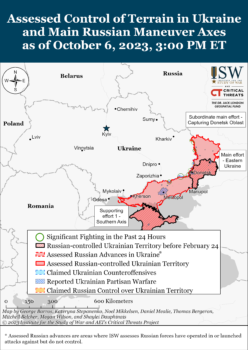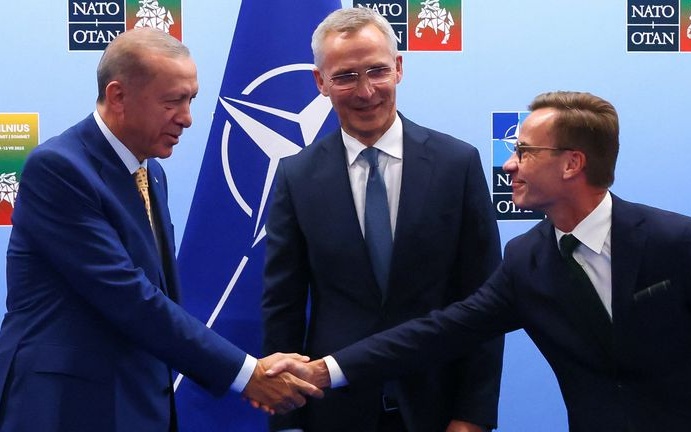(L to R): Turkish President Recep Tayyip Erdoğan, NATO Secretary General Jens Stoltenberg, and Swedish Prime Minister Ulf Kristersson, Vilnius, Lithuania, July 10, 2023 (Sky)
Monday’s Coverage: Russia Throws More Men Into Struggling Assault on Avdiivka in East

Map: Institute for the Study of War
UPDATE 1827 GMT:
A Russian military court has rejected the appeal by a 63-year-old opposition activist, Mikhail Krieger, over a 7-year prison sentence.
Prosecutors said Krieger’s Facebook posts from 2019 and 2020 “justified terrorism” and “incited hatred”. The posts said Vladimir Putin should be “hanged” and praised men who attacked officers of State security service FSB as “heroes”.
At Tuesday’s hearing, he criticized the Kremlin’s invasion and shouted “Glory to Ukraine!”.
During his trial, the activist refused to apologize for his posts and said he was being “persecuted” for his “anti-war and openly pro-Ukrainian position.
UPDATE 1330 GMT:
Ukraine Prime Minister Denys Shmyhal says Kyiv expects an additional €1.4 billion ($1.49 billion) aid package from Germany to improve air defenses.
Germany is preparing a 1.4 billion euro winter aid package for Ukraine, including air defence equipment. Grateful to @OlafScholz and the entire 🇩🇪 people for their support.
__________________
Німеччина готує зимовий пакет допомоги Україні на €1,4 мільярда, в який зокрема… pic.twitter.com/dS4EyitCLA— Denys Shmyhal (@Denys_Shmyhal) October 24, 2023
Shmyhal’s message followed a meeting with German Chancellor Olaf Scholz in Germany. The Prime Minister said:
Germany plays an important role in strengthening Ukraine’s defense capabilities, as well as in cooperation with the European Commission. Thank you for this, and we count on your continued unwavering support.
Shmyhal also said Ukraine has set up a joint defense venture with German arms manufacturer Rheinmetall AG to service and repair western weapons.
Shmyhal told the German-Ukrainian Business Forum in Berlin that the agreement will bring “cooperation between our countries to a qualitatively new level and will allow us to build together the arsenal of the free world”.
Rheinmetall will have a 51% stake in the plant on Ukrainian territory.
Shmyhal told reporters:
The first project will be repairing of German equipment, tanks, heavy armoured vehicles, Panzerhaubitzers and other German equipment.
All other production projects – it’s not public information, but we have some plans what to produce in Ukraine, but the companies will announce it by themselves when the time will come.
UPDATE 1218 GMT:
The European Commission says the European Union is on course to ending reliance on Russian fossil fuels by 2030.
The Commission expects imports of Russian gas to be 40 billion to 45 billion cubic meters in 2023, compared with 155 billion in 2021. However, it cautions:
The worst effects of the crisis may now be behind us but there is no room for complacency. Energy markets remain vulnerable, fossil fuel subsidies have increased during the crisis, inflation is still high, and our critical infrastructure needs to be protected, including from sabotage.
UPDATE 0724 GMT:
The latest Russian attacks on the Kherson region have killed two civilians and injured 20, including a child.
Governor Oleksandr Prokudin said Russia carried out 101 attacks with 597 shells over 24 hours. Targets included residential buildings and a critical infrastructure facility and plant in Beryslav.
UPDATE 0711 GMT:
The Washington Post reports that Ukraine’s State security service organized the bombing that killed Russian propagandist Darya Dugina in August 2022.
The Post article about Ukraine’s services and their covert operations is based on interviews with more than two dozen current and former Ukrainian, US, and Western intelligence and security officials.
Dugina was slain when her car — in a convoy including her father, the prominent polemicist Alexander Dugin — exploded near Moscow. “Officials who provided details” told the Post that the components for the bomb were smuggled into Russia in a cat crate, in a car with a mother and her 12-year-old daughter.
The officials said Alexander Dugin was the intended target of the operation.
UPDATE 0609 GMT:
Sweden’s Government says a undersea telecommunications cable with Estonia was deliberately sabotaged on October 8.
Civil Defense Minister Carl-Oskar Bohlin said in a statement, “It has been confirmed that the cable has been damaged through external force or tampering.”
The Sweden-Estonia link was struck on the same day as damage to both the Baltic Connector gas pipeline and a telecommunications cable between Estonia and Finland.
Finnish investigators have said their link with Estonia was damaged by “quite heavy force”, after the Russian survey vessel Sibiryakov conducted “underwater activities” in the area in June, August, and September.
Sweden’s Bohlin added that Estonia has also assessed that “the damage to the gas pipeline and communications cable between Finland and Estonia is related to the damage to the communications cable between Sweden and Estonia”.
In the aftermath of the incidents, NATO is increasing naval patrols in the Baltic Sea.
ORIGINAL ENTRY: Turkey’s Erdoğan Government has finally submitted the bill endorsing Sweden’s NATO membership to Parliament.
The Government confirmed on Monday that it is seeking the ratification for Sweden to become the 32nd country in the alliance, following Finland’s accession in April.
The Protocol on Sweden's Accession to NATO was signed by President @RTErdogan on October 23, 2023 and referred to the Grand National Assembly of Türkiye.
— Presidency of the Republic of Türkiye (@trpresidency) October 23, 2023
Sweden and Finland applied in May 2022. President Recep Tayyip Erdoğan blocked their access. He demanded that both countries crack down on Kurdish activists, as the Government continues its 39-year fight with the Kurdish insurgency PKK.
Ankara lifted its objection against Helsinki early this year, but continued to hold up Stockholm. Erdoğan finally said in July that he would approach Parliament to endorse Sweden.
See also “Never Again Alone”: Finland’s Path to NATO
The only other NATO member holding out is Hungary, whose Prime Minister Viktor Orbán is a long-time ally of Vladimir Putin.
To cover its blockade, Budapest has complained that Sweden has criticised the state of Hungarian democracy. However, NATO officials say Hungary has repeatedly reassured them that it will not wait to be last to ratify Sweden’s accession.
The Hungarian Parliament also acted quickly after Turkey accepted Finnish membership.
Sweden’s Prime Minister Ulf Kristersson welcomed the Turkish news on social media:
Welcome that President Erdoğan signed Sweden’s ratification protocol to NATO and submitted it to the Grand National Assembly of Türkiye. Parliamentary procedures will now commence. We are looking forward to becoming a member of NATO.
— SwedishPM (@SwedishPM) October 23, 2023
NATO Secretary-General Jens Stoltenberg said he looks forward to the Turkish Parliament’s “speedy vote”.

